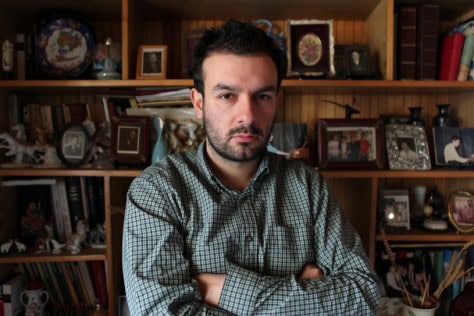Steven Soderbergh’s biopic, Che, started out as a Godard-influenced piece of experimental whimsy before it found its final form as a brutally realistic, action-packed, 4+ hour epic. Pick up our current print issue for the full interview with both the director and cover star Benicio del Toro. In the meantime, here’s a few of the choicest tidbits from our conversation with Soderbergh at his New York studio. (We spoke with him right before he commenced shooting G.F.E., starring porn actress and extreme fellatio heroine, Sasha Grey. And you’ve probably read that his next project is a musical about the life of Cleopatra, with music from Guided by Voices. There’s a reason this man is our hero.)
ON WHETHER HE HAD TO LIKE CHE TO MAKE CHE
“I didn’t really care what I found out. You know, I’m not Latino, I don’t come from that culture, I have no vested interest in making him look one way or another. What I found out about him was really that he was a bit of a pain in the ass. That sort of came up again and again—that he was so uncompromising in his belief that a revolutionary should behave a certain way in all facets of their life. There was no point at which he dropped this ideology and chilled.”
ON LOSING MILLIONS OF DOLLARS
“It’s always seemed to me that this is what you’re supposed to do with whatever momentum you have, you’re supposed to take advantage and do the things you haven’t done. I’ve tried to be smart about when I do that and under what circumstances, but on two occasions I fucked up, I spent more money on a weird idea than I should have: Solaris and The Good German. Not that I’m willing to do anything to have something make money, but I don’t like losing Fox 40 million dollars and I don’t like losing Warner Bros. 30 million dollars cause again, it hurts the people behind it who are trying to get something weird off the ground.”
ON MASTURBATION AND A STEVEN VS. CHE MATCH-UP
“[Che] doesn’t strike me as a big masturbator, I have to say. That was an impression that I felt early on. All of my research confirms it. Not a big masturbator.” The conversation then evolved into a hypothetical Soderbergh vs. Guevara showdown. “What could I do that he couldn’t do? I know I could out drink him. There’s no question. He used to dilute his wine with water, which is really strange. I know I can drink him under the table—and then I could take his gun. Better baseball player than him, for sure. I think I know more jokes than him. That’s about it, I think. I’d have a really hard time getting up every day and putting on fatigues and walking around and not having people laugh at me. I’m fascinated by people [who] can do that. I mean from the point of the revolution until he died, unless he was in disguise and traveling, he wore fatigues and military boots every day. I would have a hard time doing that without a heavy dose of irony.”
ON CHE, THE COMMERCIAL SYMBOL
“I mean there’s life and then there are representations of life, and they are not the same thing. The movie is now essentially a 4-½ hour version of a t-shirt, but it’s still a form of a T-shirt. Absolutely.”
ON THE EARLY, GODARD-INFLUENCED SHAPE OF THE FILM
“Initially I was trying to find a way to do something that was somewhat impressionistic and I pursued that for a while and found that there were two problems. One is about half way through, you really started to get annoyed that there didn’t seem to be an engine driving you anywhere, and the second thing was that I began to feel like it was too fancy, that I was stepping out in front of the story a bit, as a filmmaker. Initially I was using My Life to Live, the Godard film, as sort of a template, a series of scenes that were chapters. It worked for a while and then it didn’t, and it became, it also ended up being restrictive in a way. I was having to leave things out in order to adhere to this construct, this sort of storytelling conceit. And I just decided, you know, this is not in keeping with him, somehow. This is just getting too high falutin’ and I need to back off of it, and there are too many things that I want to include that I wouldn’t be able to include if I had to stick to this.”
ON HIS NEXT PROJECT, STARRING PORN STAR SASHA GREY
“It’s about this $2,000/hour call girl. I want the tag line to be See it with someone you fuck.”
ON HIS DREAM PROJECT: ADAPTING JOHN BARTH’S 700+ PAGE NOVEL THE SOTWEED FACTOR
“I’d shoot it sort of like an episode of Cops, because I really want to tear apart this well-mounted, polite version of history. The book is incredibly profane and just sweaty and dirty. I really want people to understand how foul life was in 1700. There just wasn’t a lot about it that we today would find appealing. And I want the ability to digress. There are these great digressions in [the book]. There’s an amazing digression into the John Smith/Pocahontas myth that is one of the nastiest, funniest passages that I’ve ever read in a book. It’s hilarious, and I want to do it as a stop-motion sequence. Like this 20-minute stop motion sequence that’s, you know, NC17 basically about the real story of John Smith and Pocahontas. So I don’t know, it could be nutty. If I was in The Fountainhead, and pretending like I was Howard Rourke—it’s this building that I imagine. I got to figure out who is going to pay for that. I think what I’m going to do is hire somebody to write it, just pay somebody to write it, because I’ve got time.”
ON THE DIFFICULTIES IN TALKING ABOUT CUBA SINCE THE REVOLUTION
“It’s also complicated for me because I’ve been down there a lot, I know a lot of people who have become friends, who are not in the government. There’s a group of people I know, and respect a great deal, that are committed to staying because they are convinced that there will be changes and they want to be there to see them and they want to be a part of them; they don’t want to be someone who left and then comes back and says ‘I want you to do it this way.’ And so it’s hard for me to diss their country because I feel like, it is not the same as the States. You know, when I leave the States and somebody disses the U.S., I don’t take it personally. Half the time I go, ‘Yeah, yeah, it is kind of lame when we do this or do that.’ It’s different for them.”
ON THE FUTURE OF PORN
“There are all these free sites now. In the last 18 months, there’s such a plethora of free porn available that I don’t know how anybody is making money in porn anymore. I’m very worried about the economic structure of the porn industry.”
ON THE 1969 OMAR SHARIF FILM, CHE!
“I got a copy of it before we started shooting and I thought, ‘oh this will be amusing to watch,’ and it actually was a bad idea. [The film’s] trying to do before the revolution and through Cuba and into Bolivia, it’s trying to cover a lot of terrain. It employs a series of sort of theatrical, one could say Brechtian devices where people address the camera and talk about Che. They were recreating so many of the scenes that we were recreating that I began to get scared that that’s how our scenes were going to come across. I thought, Oh shit—what if we’re doing a super highbrow version of this and it comes across like this?’ My laughter died very quickly.”
ON DEALING WITH PEOPLE WHO DESPISE CHE
“Whenever I get into arguments with people about this, ultimately at least I’m able to say, ‘Well, I don’t understand why you’re so upset.’ First of all, he’s dead. I can understand why you’re upset about Fidel, or the Castro brothers, because they’re still around, they are still running things. Che’s been dead for 40 years and he was executed without a trial. So what are you so upset about? He died exactly the way you would have had him die. I think they are upset about this sort of image, this image of him as saintly. And it’s been interesting for people to see the film and say, ‘Oh I think you whitewashed him.’ And I just go, ‘I don’t know what you’re talking about.’ Every issue that he’s been criticized for is addressed in the film. We did not skirt this. And proportionally, I feel like it’s a pretty balanced representation of him.”
ON WHY HE USES PSEUDOYNMS RATHER THAN CREDITING HIMSELF AS EDITOR / PRODUCER / ETC.
“When I see these ads with someone’s name is in there five times…I just don’t understand the kind of person that looks and [at] that and it makes them happy. I don’t know how you look at that ad, and each of the five times your eye lands on your name, there’s a little ‘raised fist’ moment in your mind. It’s just weird.”
ON NOT LEARNING SPANISH
“[I spoke] enough to explain to the crew or the cast what I was trying to do. Like you know I could say ‘more, less, faster, slower, left right up down.’ I could kind of fake my way through a conversation. But I went right into shooting The Informant [after] and I just sort of flushed it all out. I really had a fantasy of learning the language while we were shooting and coming away fluent. After day three, I just thought, I can’t hold all that in my head. But it really didn’t matter, that’s what was interesting, it really didn’t. And I would go make a movie in Japanese or French. I wouldn’t hesitate.”
ON A PURELY HYPOTHETICAL PROJECT INVOLVING OLD WOMEN
“I sat next to these four women [at the airport] that were traveling together, in their 80s, and I listened to them talk for forty-five minutes, and it was the funniest shit ever. First of all, they ate like horses. They ate nonstop for 45 minutes. They had gone to Au Bon Pain or something like that. Their conversation was hysterical. My favorite quote: ‘I gotta tell ya, the wheelchair is the way to go.’ Cause she had been wheeled to the gate, the rest of them had walked. So she was letting them in on this. That got me thinking, ‘four 80-year-old women on a trip, man…that’s pretty good.’ I’d give them a little structure and let them go.”
 Q&A with Larry Gus
Q&A with Larry Gus We Own the Night: The Edison
We Own the Night: The Edison
No Comments